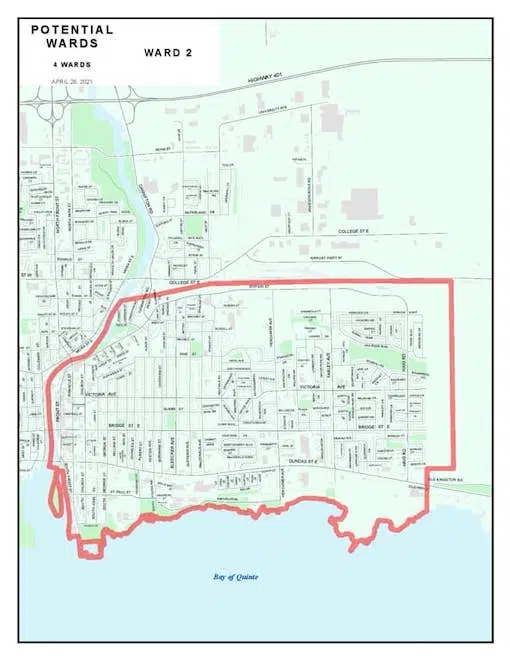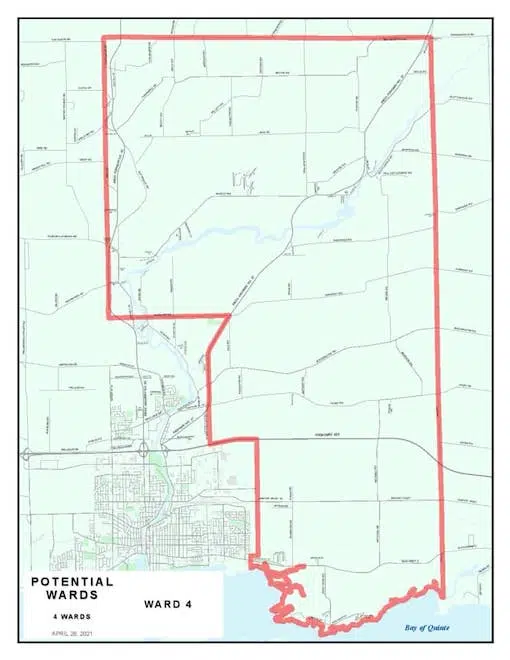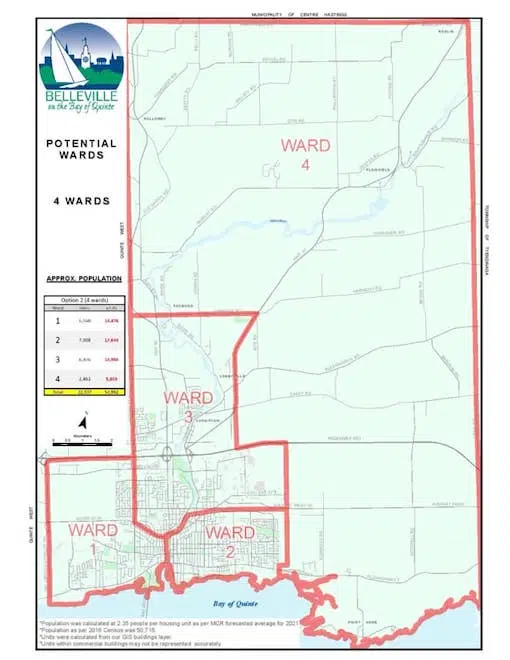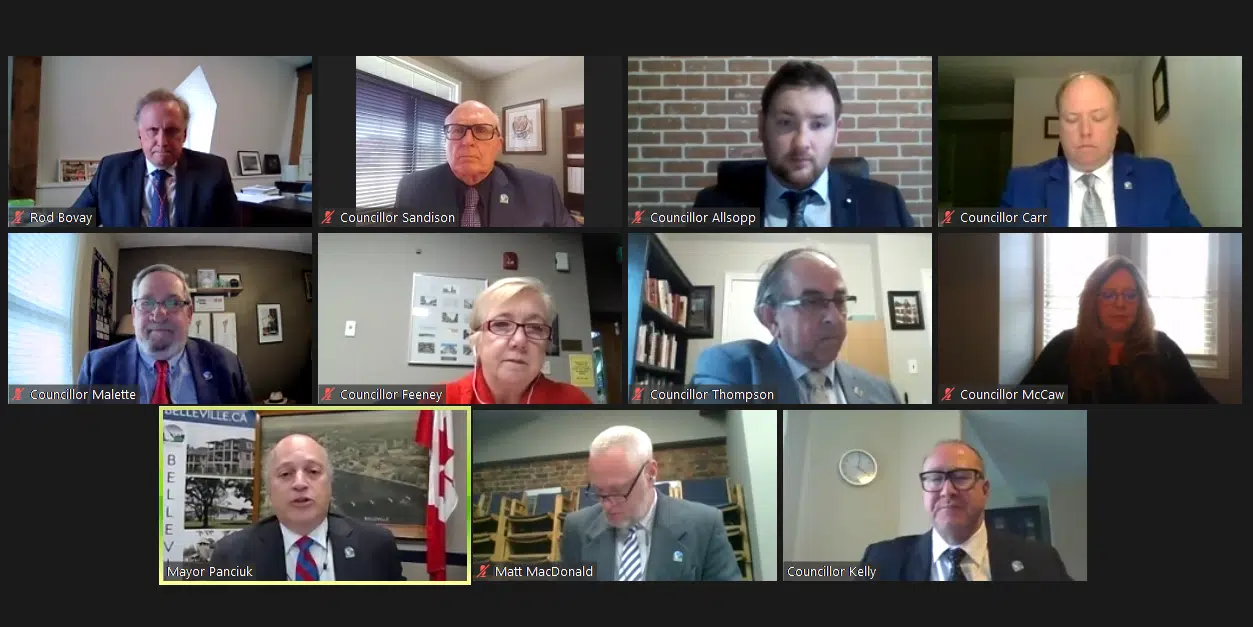A plan to change Belleville’s ward boundaries is moving forward and residents will now get to have their say on the proposal.
Mayor Mitch Panciuk officially brought the plan forward at council’s meeting on Monday.
If approved, the proposal would realign the city’s electoral boundaries into four wards from the current two.
Panciuk says the realignment addresses five key areas.
Audio Player“Under-representation of Thurlow (Ward 2) on City Council, they should have at least one additional councillor due to population grown since 1998. Honouring the agreement made in 1998 which promised that the voice of rural Thurlow would be maintained at the Belleville Council table. Making it easier for residents to choose candidates so they know who is responsible for helping them to resolve their issues, or to bring their ideas forth to the city. Making our municipal democracy stronger with more direct representation, based on a more specific geographic area and making our municipal democracy more inclusive by reducing financial barriers and time commitments required in order to campaign for a seat on City Council.”
Opinion on whether or not to move ahead was fairly split during about an hour-and-a-half worth of discussion, with some councillors feeling the change would allow for better representation across the city and others countering that the current system is working without issue and there was no need for the realignment.
Longtime Councillor Garnet Thompson kicked off the debate by noting that in his tenure, he’s never heard any substantial uproar about a need to change the ward boundaries, while also voicing concern about getting enough public input during a pandemic.
Audio Player“Yes, our city is growing. But all of a sudden we’re going to try and come to a decision on a short period of time and we’re just getting out of COVID. You know, even at the time of election when we get the mayors doing their speeches at the Empire Theatre, we’re lucky if we get 300 or 400 people out. I feel that if there’s any way possible, this should be a referendum.”

The proposed boundaries for Ward 1, if Belleville were to move ahead with a four-ward system.
Councillor Sean Kelly began his remarks by thanking the mayor for his work on “looking at a possible way forward” but wasn’t overly receptive to the idea.
He asked what wasn’t working, and thought that splitting the wards further wouldn’t make a difference in how residents are represented.
Audio Player“I look at council, and this is me speaking, as one team. We represent everybody. I don’t look at the ward system and think that when I cross the 401 I’m in Ward 2 now, I don’t look at it that way. I look at it as nine people working for every resident of the City of Belleville.”
Kelly also added that he felt it would be tough to have meaningful conversations with residents during the pandemic.
He was challenged on that by Panciuk, who noted the mass amount of community engagement back in December over filling the late Pat Culhane’s vacant council seat.
Council newcomer Tyler Allsopp was next to speak, saying he was initially on the fence about whether or not to move forward and raised the importance of resident feedback on the plan, especially during the pandemic.
Allsopp says he’ll wait and see how much the people of Belleville make themselves heard on the issue over the next few months, adding that a small sample size won’t be enough input to make an informed decision.
Audio Player“If the results of those conversations are ‘we are not interestesd in this change’. If the results of those conversations are ‘we are not interested at all’, just complete apathy where nobody cares, and we have no results to go on, then this is going to be a very easy decision for me in August. I’m going to say listen, people didn’t want it, it’s not happening. Or, people didn’t care enough to tell us that they wanted it, it’s not happening.”

The proposed boundaries for Ward 2, if Belleville were to move ahead with a four-ward system.
Councillor Kelly McCaw leaned on her well-used expression that “if nothing changes, then nothing changes.”
She told councillors that in her opinion, “democracy is under threat of being silenced, by simply not allowing the process to go forward” and says they should be open to hearing what residents have to say.
Audio Player“What are you afraid of exploring here? Are we looking after the best interest of the constituents, or are we looking out for ourselves? Because the only difference I see here is who gets to vote for us. And honestly, I’ve represented Ward 2 residents as thoroughly as I have Ward 1, so that doesn’t mean anything. It doesn’t mean that we will be divided in any way, we’re only divided by ourselves and the divisions we put with each other, so certainly that doesn’t hold water with me.”
Thurlow Councillor Paul Carr echoed the sentiments about not hearing a need for change from residents and also potentially making this a referendum during the next municipal election.
He says the current system already has proportionate representation and that even though he lives in Thurlow, he can identify with all residents of the city.
Audio Player“I can relate with the majority of Ward 2 residents in currently having no sidewalks on my street, a private well and a septic, just as I did when I purchased my home in Thurlow in 1998. And while we’ve seen four suburban areas added to Ward 2 through slow and steady growth, they continue to be islands within a rural area, bordered by rural residents. But the changing landscape in the wards doesn’t change the way I focus as a councillor. I serve every resident equally, regardless of their issue, regardless of where they live. The effectiveness of the representation rests with the individual councillor.”

The proposed boundaries for Ward 3, if Belleville were to move ahead with a four-ward system.
However, fellow Thurlow Councillor Bill Sandison was on board with the changes saying that by looking at the proposed maps, he felt moving the more urban part of Ward 2 into a newly-formed Ward 3, would make sense.
Sandison also pointed out that each resident’s vote would carry more weight under the new system, because they would only be electing two councillors instead of six.
He added that smaller wards might increase voter turnout and even make running for council more accessible to more people.
Audio Player“It’s more inclusive. As each of the three wards have about 15,000 it would allow people that might not otherwise have the financial means to run for office, to be included, as the cost of their campaign would be reduced. So really, by dividing it into smaller groups, I think it opens it up to people who might not have that opportunity. It does help foster a closer relationship between the residents of the ward and their two councillors, and it makes each of them more accountable.”
Councillor Chris Malette noted that in his time on council, he’s already been helping and speaking with residents from across the city, not just where he lives.
He told the meeting that he felt “it’s the wrong proposal at the wrong time” and called it divisive, because the city isn’t as big as it’s made to seem.
Audio Player“I think that this kind of move will prompt the city to lose its ‘all for one and one for all spirit’, that we see around this table, in favour of protection and advocacy for turf, if you will, and protecting one’s election chances even. Again, division does not promote unity and this by-law and sectioning off areas of the city into wards, does plenty in my view, to erode that unity.”

The proposed boundaries for Ward 4, if Belleville were to move ahead with a four-ward system.
The newest member of Belleville Council spoke last, as Councillor Carol Feeney said she would support the move and was looking forward to hearing what residents think of the plan.
Feeney shared her experience as a first-time candidate, trying to navigate around the city while campaigning and felt that a change to the wards might encourage more people to get involved, while accomplishing the goal of having a more diverse group of councillors.
She added that she felt a change could help to bring more amenities to different parts of the city and disagreed with the notion that the wards would create a divide.
Audio Player“We as councillors sit around that horseshoe and we all have to represent Belleville. We may do certain parts of it specifically, but in our heart of hearts and our heads, it’s the fact that it’s for the benefit of the whole geographic region. Also the fact that this is just an initial discussion and that we really want to engage and involve the public, so I’ll be voting for the motion.”
The proposal was moved along by a narrow vote, with a public consultation period set to begin once a by-law is passed at the next meeting on May 25 and a final decision to be made on the issue in August.
You can click here for more on the initial proposal and give us your thoughts, by voting in our Quinte News Poll below.


Belleville Council will consider starting the process of moving from a two ward electoral system to a four ward system, at its meeting on Monday May 10, 2021. Here is a proposal of what those ward boundaries would look like.




